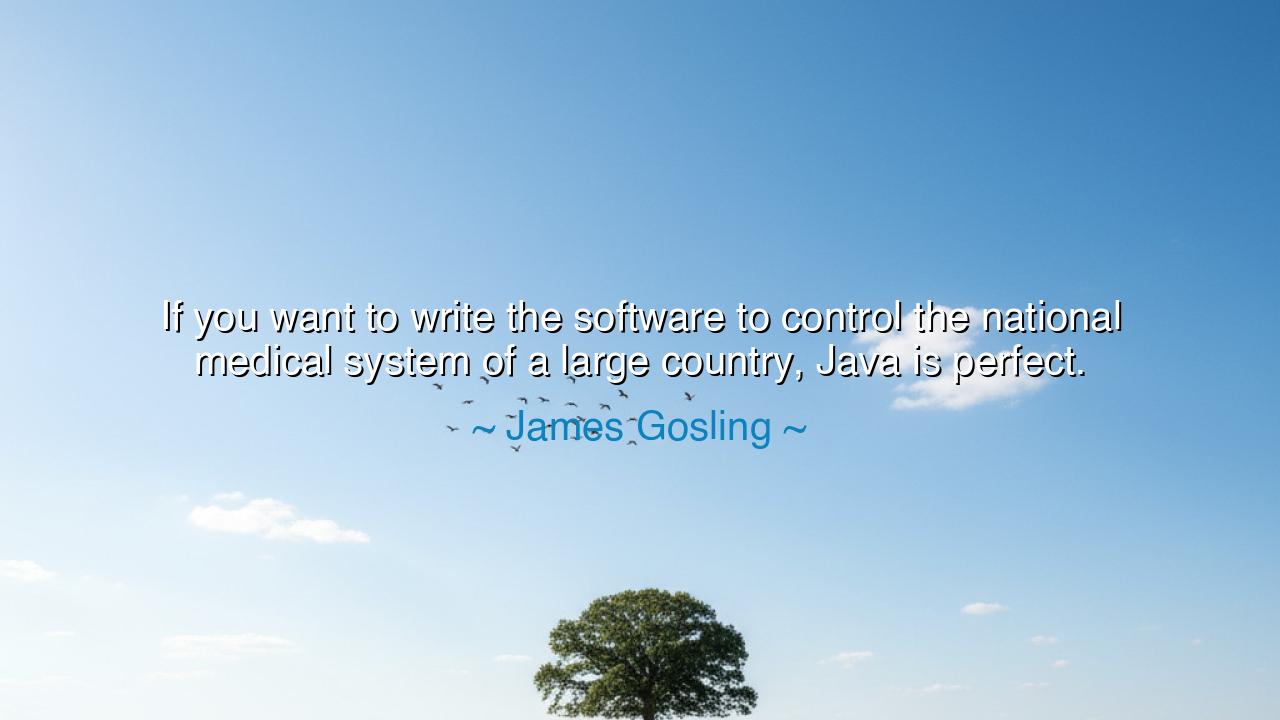
If you want to write the software to control the national medical
If you want to write the software to control the national medical system of a large country, Java is perfect.






In the insightful words of James Gosling, “If you want to write the software to control the national medical system of a large country, Java is perfect,” we are confronted with the vast and intricate relationship between technology, systemic control, and human well-being. Gosling, the creator of the programming language Java, speaks to the unparalleled capabilities of this tool in building systems that are not only vast in scale but also robust and reliable—critical qualities when designing software that governs something as essential as a nation’s medical infrastructure. His words are not just about programming languages; they are a meditation on the role of technology in managing the complexities of human society, where each line of code must serve not only function but also humanity.
The origin of this quote lies in the development of Java as a programming language—a language designed with the intention of being platform-independent, versatile, and scalable. It became a tool capable of supporting everything from web applications to large-scale systems like those needed in healthcare management. Gosling’s statement speaks to Java’s robustness, its ability to handle vast amounts of data, and its cross-platform compatibility, making it the ideal choice for building critical systems, such as those that manage national healthcare. Just as the ancients crafted their tools with the understanding that they would shape the course of civilizations, so too does Gosling recognize that technology, when wielded with care and foresight, shapes the future of nations and their people.
In the ancient world, great civilizations were built upon the precision of their systems, whether in architecture, governance, or military organization. Consider ancient Rome, whose engineers built aqueducts and roads that spanned the empire, uniting diverse lands and peoples under a single system. The Roman Senate relied upon carefully designed systems of law and governance to maintain order. Similarly, Gosling’s words are a reminder that to manage something as important as a country’s medical system, the tools we create must be capable of supporting the intricate networks of people, data, and decisions. Java, in this sense, becomes not just a language but a symbol of order, control, and wisdom, tools forged to serve the greater good.
Consider the example of China's healthcare system, which has undergone significant modernization over the years, often relying on large-scale technology to ensure that its vast population receives care. As artificial intelligence and >bridging gaps between healthcare providers, patients, and governmental oversight. This aligns with Gosling’s insight: Java is perfect for managing large, complex systems that require both adaptability and reliability, much like the human body itself, which is also a complex system requiring constant attention and care.
What Gosling implies in his statement is not just about choosing the right tool for the job, but about understanding the impact of that tool. Just as an ancient blacksmith would choose the finest iron to forge a weapon or tool, we too must recognize that the tools we design—whether for healthcare, governance, or communication—shape the future. The stakes are high. A malfunction in a piece of software controlling medical records, for instance, could lead to disastrous outcomes, much as a failure in ancient military strategy could bring about the downfall of a kingdom. Precision, reliability, and scalability are not just ideals in technology; they are the very foundation upon which the wellbeing of individuals and societies rests.
The lesson here is profound: the tools we create are not neutral, and they carry the potential to transform society. Java, as a symbol of careful design and thoughtful engineering, teaches us that when we create systems—whether for healthcare, education, or governance—our goal must be more than just functionality. We must build with a sense of responsibility, understanding the human lives that will rely on our work. Gosling's quote calls us to think deeply about the systems we put in place, for they will outlast us and have a profound impact on generations to come.
In our own lives, we must remember the wisdom embedded in this idea. Whether we are designing software, building communities, or leading others, we must always strive to create systems that serve the greater good. Let us not create for the sake of profit or personal gain, but for the advancement and well-being of humanity. We should adopt the principles that Gosling and the ancients have shown us: to approach every task—no matter how small—with care, precision, and foresight, understanding that the systems we create today will shape the world of tomorrow.






AAdministratorAdministrator
Welcome, honored guests. Please leave a comment, we will respond soon